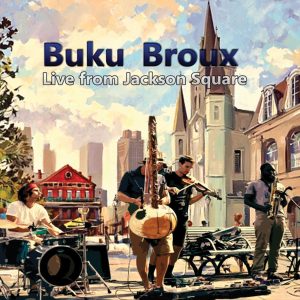 Multiculturalism is nothing if not the lifeblood of New Orleans culture, from its food to its music to its architecture, which is why it’s always great to see a band consciously try to combine elements that maybe haven’t been mashed up before. In this case, Buku Broux lays down Brazilian rhythms mashed up with good old NOLA funk, and then uses that to set off a jazz odyssey of competing saxophone and violin solos, both heavily processed and tricked out almost to the point of psychedelia. Add to this a similarly electronically tweaked version of a traditional African harp, or kora, and you get a truly unique and eclectic mix of cultures. At times during this band’s second album, it feels as if the forests of Brazil or the jungles of darkest Africa have started to grow right out of the urban sidewalk; the soundscapes they paint often feel teeming with life, like the wilderness itself. But it’s electric life.
Multiculturalism is nothing if not the lifeblood of New Orleans culture, from its food to its music to its architecture, which is why it’s always great to see a band consciously try to combine elements that maybe haven’t been mashed up before. In this case, Buku Broux lays down Brazilian rhythms mashed up with good old NOLA funk, and then uses that to set off a jazz odyssey of competing saxophone and violin solos, both heavily processed and tricked out almost to the point of psychedelia. Add to this a similarly electronically tweaked version of a traditional African harp, or kora, and you get a truly unique and eclectic mix of cultures. At times during this band’s second album, it feels as if the forests of Brazil or the jungles of darkest Africa have started to grow right out of the urban sidewalk; the soundscapes they paint often feel teeming with life, like the wilderness itself. But it’s electric life.
While they create a far more exotic atmosphere than what you would find in most jazz clubs, Buku’s lack of a true bottom end also makes their sonic palettes a little more spritely and ethereal; their electrified kora is the lowest instrument here, but it doesn’t move the rhythm along so much as provide a universally folkish background for all the improv. To call it fusion would be to belabor the obvious. All the pancultural streams flowing through these sixteen instrumentals—which were indeed recorded live and outside, though you’d never know it from the insular production—feel naturally at home with each other, whether it’s the Middle Eastern guitar apoplectics of “Cyclops” or the pointedly titled “Roots, Harp, Reggae” or a “Misirlou” that takes the standard all the way back to the bazaar. And a bazaar is ultimately where this group would sound most at home: a gathering place to celebrate our shared humanity.




